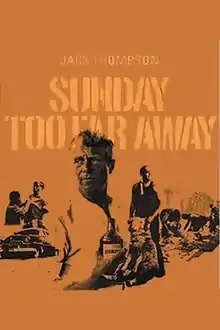Sunday Too Far Away
Sunday Too Far Away is a 1975 Australian drama film directed by Ken Hannam. It belongs to the Australian Film Renaissance or the "Australian New Wave", which occurred during that decade.
| Sunday Too Far Away | |
|---|---|
 DVD Cover | |
| Directed by | Ken Hannam |
| Produced by | Gil Brealey Matt Carroll |
| Written by | John Dingwall |
| Starring | Jack Thompson Robert Bruning Reg Lye Max Cullen Peter Cummins John Ewart |
| Music by | Patrick Flynn |
| Cinematography | Geoff Burton |
| Edited by | Rod Adamson |
Production company | |
| Distributed by | Roadshow Film Distributors |
Release date |
|
Running time | 94 minutes |
| Country | Australia |
| Language | English |
| Budget | A$300,000[1] |
| Box office | A$1,356,000 (Australia) |
The film is set on a sheep station in the Australian outback in 1955 and its action concentrates on the shearers' reactions to a threat to their bonuses and the arrival of non-union labour.
Acclaimed for its understated realism of the work, camaraderie and general life of the shearer, Jack Thompson plays the knock-about Foley, a heavy drinking gun shearer (talented professional sheep shearer), and while he makes a play for the station owner's daughter Sheila (Lisa Peers), the film is a presentation of various aspects of Australian male culture and not a romance; the film's title itself is reputedly the lament of an Australian shearer's wife: "Friday night [he's] too tired; Saturday night too drunk; Sunday, too far away".[2]
Sunday Too Far Away won three 1975 Australian Film Institute awards: Best Film, Best Actor in a Leading Role and Best Actor in a Supporting Role.
Plot
In 1956, gun shearer Foley joins a new shearing team sharing a room with Old Garth, a once great shearer who is now a drunk. Foley and his team battle to get in a new cook, Old Garth dies and Foley befriends the grazier's daughter. Foley loses his status as top shearer to Arthur Black and blows most of his money gambling. The shearers go on strike and Foley and his team get involved in a brawl with non union labour.
Cast
- Jack Thompson as Foley
- Max Cullen as Tim King
- Robert Bruning as Tom West
- Jerry Thomas as Basher
- Peter Cummins as Arthur Black
- John Ewart as Ugly
- Sean Scully as Beresford
- Reg Lye as Old Garth
- Graham Smith as Jim the Learner
- Laurie Rankin as Old Station Hand
- Lisa Peers as Sheila
- Philip Ross as Mr Dawson
- Ken Shorter as Frankie
Production
The film was the first feature produced by the South Australian Film Corporation. They wanted to make a film about the Gallipoli Campaign and considered a co-production with Crawford Productions. John Dingwall was signed to write it. However the film fell through when Crawfords fell out with the SAFC. Dingwall, still under contact to them, proposed instead a treatment called Shearers, based on his brother-in-law, who was a shearer. Matt Carroll at the SAFC was particularly enthusiastic and recruited Ken Hannam to direct. The original treatment concerned the 1956 shearer's strike. This ended up being condensed greatly.[3]
Among the investors in the movie were the Australian Film Development Corporation.
Shooting began in May 1974 and took place near Port Augusta and Quorn in South Australia. It encountered rains and flood and was completed behind schedule in May.[1]
The original cut of the film was over two hours. A number of scenes were reduced during post production, including the removal of Foley's romance with the grazier's daughter, and shifting Foley having a car crash from the end of the movie to the beginning.[1] This caused a great deal on conflict between Ken Hannam, Gil Brearley and Matt Carroll.[3]
Release
Before being released, the film won four major prizes at the Australian Film Awards in March 1975 and was selected for screening in the Directors' Fortnight at Cannes Film Festival in May.
Sunday Too Far Away grossed $1,356,000 at the box office in Australia,[4] which is equivalent to approximately 9.5 million in 2019 dollars.
References
- Andrew Pike and Ross Cooper, Australian Film 1900–1977: A Guide to Feature Film Production, Melbourne: Oxford University Press, 1998 p287
- Rees, Nigel. Mark My Words: Great Quotations and the Stories Behind Them. Barnes & Noble, Inc., 2002. ISBN 0760735328, p. 30
- David Stratton, The Last New Wave: The Australian Film Revival, Angus & Robertson, 1980 p98-101
- Film Victoria - Australian Films at the Australian Box Office
External links
- Sunday Too Far Away at the Internet Movie Database
- Sunday Too Far Away at the National Film and Sound Archive
- Sunday Too Far Away at Australian Screen Online
- Sunday Too Far Away at Murdoch University Reading Room
- Sunday Too Far Away at British Film Institute
- Sunday Too Far Away at Oz Movies
- Cinephilia
- Sunday Too Far Away at New York Times
- Kodak/Atlab Cinema Collection